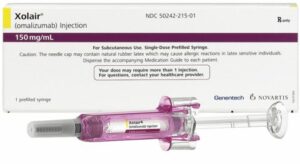What is Xolair® and how does it work? Learn more about this medication that received U.S. approval for reducing food allergic reactions. Plus, learn about a new study that provides possibilities for treatment in older children, and find out how you can participate in a research opportunity for children with tree nut allergy involving immunotherapies.
Research: U.S. FDA approves Xolair® to reduce reactions to foods after accidental exposure
Last month, the U.S. Food and Drug Administration (FDA) approved Xolair® (omalizumab) for reducing the risk of allergic reactions, including anaphylaxis, among certain patients with one or more food allergies.

Xolair is a biologic given as an injection under the skin to help protect children and adults against accidental exposure to multiple foods. Patients who take Xolair must continue to avoid foods to which they are allergic.
“This newly approved use for Xolair will provide a treatment option to reduce the risk of harmful allergic reactions among certain patients with IgE-mediated food allergies,” said Kelly Stone, M.D., Ph.D., associate director of the Division of Pulmonology, Allergy, and Critical Care in the FDA’s Center for Drug Evaluation and Research. “While it will not eliminate food allergies or allow patients to consume food allergens freely, its repeated use will help reduce the health impact if accidental exposure occurs.”
This is big news for the food allergy community that brings optimism and hope for treatments and therapies. Read below for additional context on what this news means and what we are doing to advocate on your behalf for access to treatments and therapies.
What this news means to Canadians impacted by food allergy
Xolair is the first approved medication for food allergy, this is indeed big news for the food allergy community. While we are excited by the possibilities for Xolair, it’s also important to understand what the treatment delivers and what needs to happen to make it a viable option in Canada. To that end, we have put together a quick summary, and we will be scheduling an upcoming webinar with experts to walk us through the clinical trials that led to Xolair’s approval. Stay tuned on details for the webinar, in the meantime, check out the summary below.
What is Xolair and who can now use it as a food allergy treatment in the US?
Xolair is a biologic medicine designed to target and block immunoglobulin E (IgE), the antibody that triggers allergic reactions. It is given as an injection under the skin every 2 or 4 weeks, and those taking it must continue to avoid their allergens. Once someone stops taking Xolair, the IgE is no longer blocked.
Over the past several years, this drug has been in a clinical trial to determine if it could be effective and safe as a therapy in patients with multiple food allergies. The trial included individuals between 1-55 years of age with allergy to peanut and at least two other trial-specified foods (cashew, milk, egg, walnut, wheat, and hazelnut). Findings revealed that the medication allowed them to tolerate higher amounts of such foods without causing major reactions.
Based on the trial results, the FDA has approved Xolair for use in certain adults and children for the reduction of allergic reactions that may occur with accidental exposure to one or more foods.
What needs to happen in Canada for Xolair to be an approved medication?
Novartis, who owns Xolair in Canada, needs to file for market access approval with Health Canada. We’ve reached out to Novartis to understand their plans. Additionally, work needs to be done to understand how the cost of this treatment will be covered. Currently in the US, the monthly costs range from $2,900/month for children to $5,000/month for adults.
So why is this big news?
Despite the hurdles that need to be addressed to gain access in Canada, having one possible medication begins to shift the paradigm from a “diagnosis and avoid” model to one that offers treatments as a management approach to food allergy. With this shift, we can anticipate more research into better treatment options, given that food allergy is now considered a treatable condition. For individuals with food allergy, this will provide options, so they can select a management approach that works best for them, ultimately leading to improved quality of life.
OIT treatment
Many of you may be aware that oral immunotherapy (OIT) is also being offered by some allergists across Canada, but access remains limited and targeted mostly to young children where the results are deemed to be better. Research suggests that this treatment can be demanding to follow and only suitable for those who can fit it into their daily lives, and are confident in managing potential reactions. For those who do undertake this treatment, the vast majority are very satisfied with what it delivers.
Other forms of immunotherapy are being investigated which provides additional options, and the medical community continues to focus on ways to improve immunotherapy, both in efficacy and making it an easier treatment for patients.
Advocating for access
Managing food allergy through avoidance is an effective strategy for many Canadians and will be a mainstay approach, but for those who face significant burden, new treatment options would be transformational. You can continue to count on Food Allergy Canada to advocate for everyone impacted by this condition, with the goal of improving quality of life.
Whether it’s access to accurate ingredient information and building informed and supportive communities to make it easier for you to avoid your allergen, ensuring the public takes food allergy seriously, or new treatment options for those who need enhanced protection against severe reactions, while continuing to call on researchers to find a cure – we are your champion and voice at the table.
Research: Canadian study reveals a safer treatment path for high-risk children with food allergy
A new Canadian study finds sublingual immunotherapy (SLIT), which involves placing smaller amounts of food allergens under the tongue, to be a safe and effective treatment for high-risk children.

The study was conducted by Dr. Edmond Chan, UBC clinical professor, pediatric allergist and a member of our Healthcare Advisory Board, and his team at BC Children’s Hospital Research Institute.
Generally, SLIT has been shown to be safer and better tolerated than OIT, with lower effectiveness. The researchers in this study found SLIT to be as safe and effective for high-risk older children as oral immunotherapy (OIT) is for preschoolers.
“Our work confirms the safety and effectiveness of SLIT for older children and adolescents with multiple food allergies at higher risk of severe reaction,” said Dr. Chan. “These are patients for whom oral immunotherapy would typically be denied because it’s felt to be too risky, so this could be the best approach for that population.”
This research highlights an alternative that can be considered for patients who cannot safely undertake OIT and brings with it the possibility of expanding therapy options for treating food allergy.
Research study: Call for participation for children with tree nut allergy

A research study is underway in Hamilton, Ontario. The researchers are seeking children aged 1-16 years who have been diagnosed with tree nut allergy, specifically to cashew, pistachio, walnut, pecan, almond, or hazelnut.
The study is testing different immunotherapies to desensitize a person with tree nut allergy by repeated exposures to very small amounts of tree nut through sublingual immunotherapy (SLIT) or low-dose oral immunotherapy (IdOIT). SLIT is when a food allergen is placed under the tongue and OIT is when a food allergen is eaten.
Food Allergy Canada is involved in this research through a patient/caregiver partnership where we provide input on the design of the research, review research outcomes, and ensure the patient perspective is considered.
Click the learn more button below to read additional details about the study from the research team. To learn more about the study and if your child is eligible to participate, complete this form or email eia@mcmaster.ca.
Please share with others whose children have tree nut allergy.
Tags: immunotherapies, OIT, SLIT, treatments and therapies, Xolair
